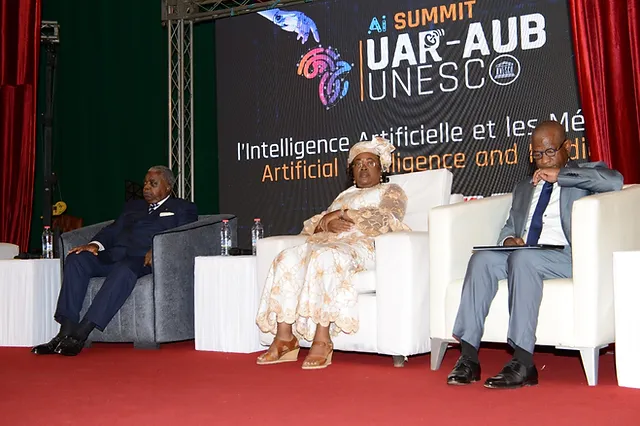The past decade has witnessed rapid advancements in technology and new scientific approaches in human interactions. While the digital age brings advanced developments for sophisticated societies, UNESCO’s priorities in this field are rooted in developing technologies with solid ethical guarantees while enhancing its role in the right to access information. These ethics, focusing on the integration and use of artificial intelligence, under UNESCO’s dominance, guided recommendations on the ethics of AI endorsed by the 193 UNESCO member states in 2021.
In line with these priorities, in March 2024, UNESCO supported the African Union of Broadcasting (AUB-UAR) in organizing a three-day summit on artificial intelligence and media, held in Yaoundé from March 4th to 6th, 2024.
The summit brought together more than 800 participants, including TV and radio station managers, African media editors-in-chief, prominent scientists and researchers, decision-makers, and relevant stakeholders. The summit was attended by 43 African countries and eight countries from Europe, Asia, and the Americas, with nearly 1400 attendees in each session.
The main purpose was to address fundamental concerns arising from the emergence of artificial intelligence in African media organizations. More importantly, the goal was to envision the political, economic, and cognitive approaches to integrating artificial intelligence in an African developmental context.
UNESCO played a significant role in achieving these objectives by convening a group of experts to discuss the topic of artificial intelligence in service of Africa and the governance of AI concerning education, science, culture, and communication.
The committee, led by UNESCO’s Special Representative in Gabon and the Economic Community of Central African States, Mr. Eric Volle, included five experts, regional UNESCO advisers in education (Mr. Hilaire Mbouto), natural sciences (Mr. Diawara Bandiougou), and communication (Mr. Najib Moukni). Key participants in the committee were the Minister of Communication and Media in Gabon, Mrs. Laurence Ndoung, and Dr. Esther Olimbi, the Director of the National Archives at the Ministry of Culture in Cameroon.
The discussions were enriched with important research findings and lessons learned from the national governance experience of artificial intelligence in Gabon. In her closing remarks, the Gabonese Minister emphasized that “discussing ‘artificial intelligence and media’ means focusing on changing journalists’ roles and responsibilities, clarifying to the public and regulating AI users. The challenges are not only professional but also cultural, ethical, political, and social.”
When Dr. Esther Olimbi shared some lessons learned by Cameroon on the transformative impact of managing documentary heritage with artificial intelligence, she said:
Artificial intelligence provides opportunities to create tools for collaboration between African countries, by establishing devices that enable secure communication among each other.
Regional UNESCO advisors in Central Africa shared UNESCO’s research results and regional experiences in AI opportunities and journalism, open sciences, and the opportunities and challenges of education and learning in the era of artificial intelligence.
“I would like to take this opportunity to inform you that UNESCO has launched an exclusive educational television channel dedicated to AI in education, increasing awareness on AI-related issues, particularly ethics and artificial intelligence,” Hilaire Mbouto, UNESCO’s Regional Education Advisor in Central Africa.
As the Director of the UNESCO Office in Yaoundé, Mr. Eric Volle reiterated UNESCO’s commitment in this field, citing the example of the “Train My Generation – Gabon 5000” initiative, where 5000 Gabonese youth were trained in information and communication technologies through cooperation between UNESCO and Airtel.
In conclusion, Mr. Eric Volle reaffirmed UNESCO’s commitment to supporting member states in their mission by developing strategies and laws that promote the oversight and use of artificial intelligence.


